牛津译林版七年级下册Unit 6 Outdoor fun复习课件(共86张PPT)
文档属性
| 名称 | 牛津译林版七年级下册Unit 6 Outdoor fun复习课件(共86张PPT) |  | |
| 格式 | pptx | ||
| 文件大小 | 623.6KB | ||
| 资源类型 | 教案 | ||
| 版本资源 | 牛津译林版 | ||
| 科目 | 英语 | ||
| 更新时间 | 2023-05-07 20:57:13 | ||
图片预览


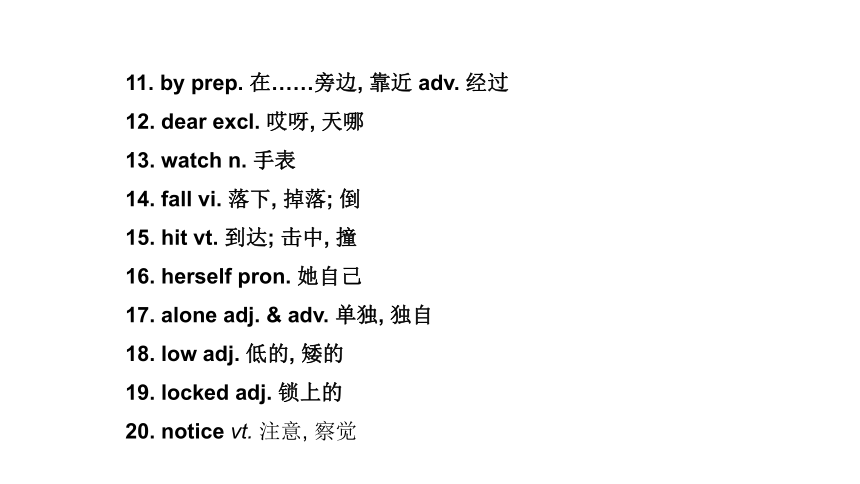
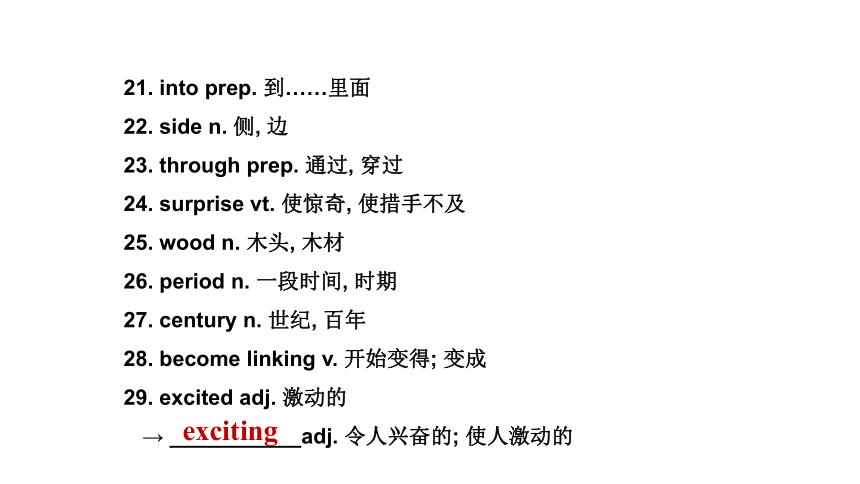
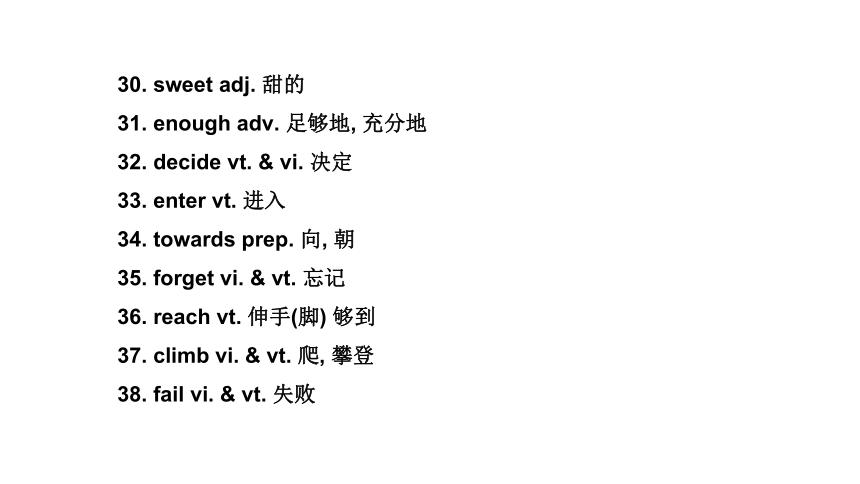
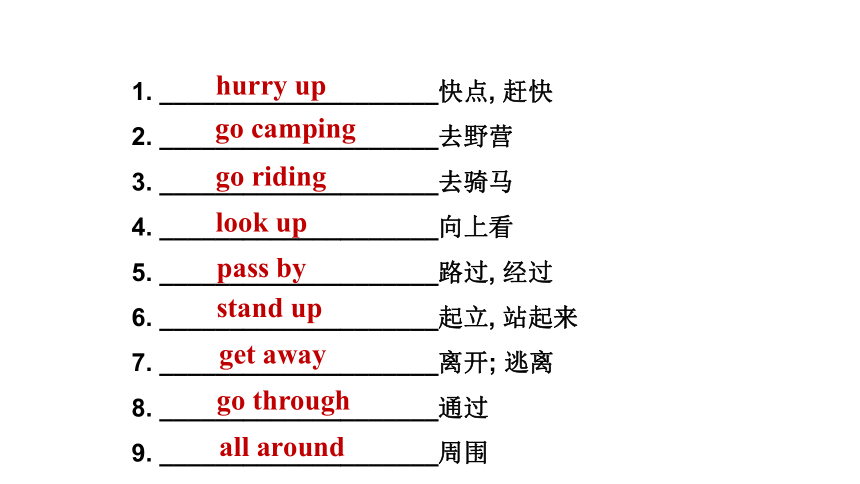
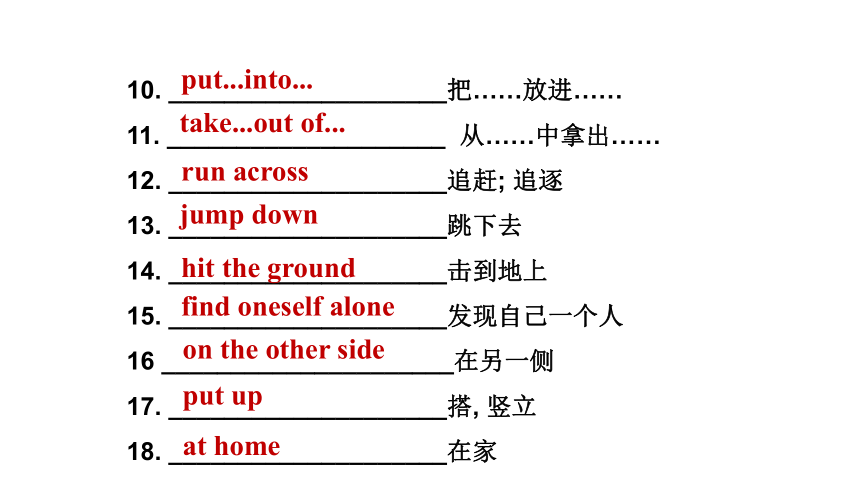
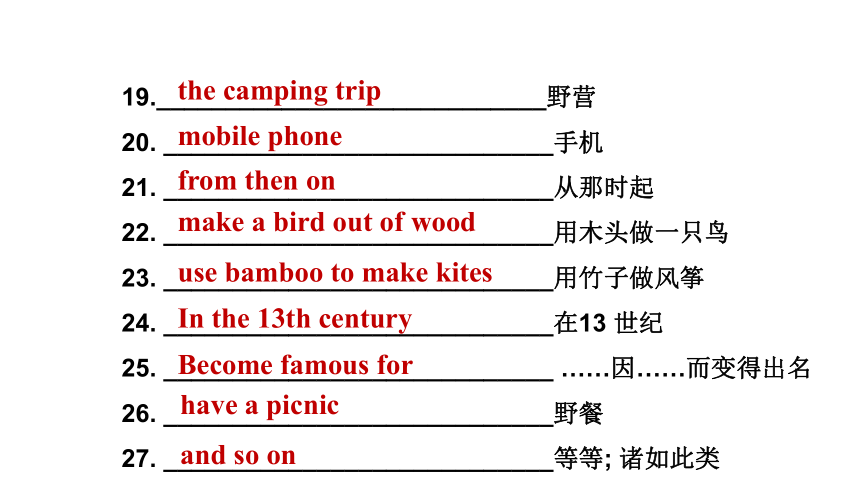
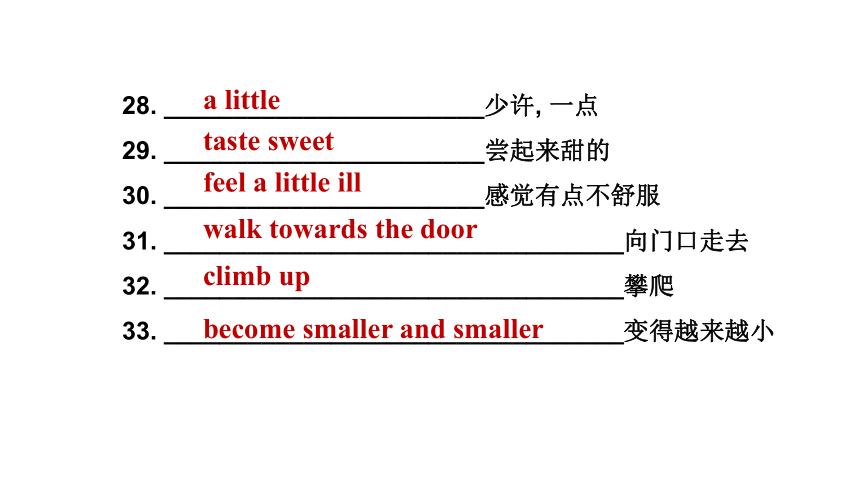
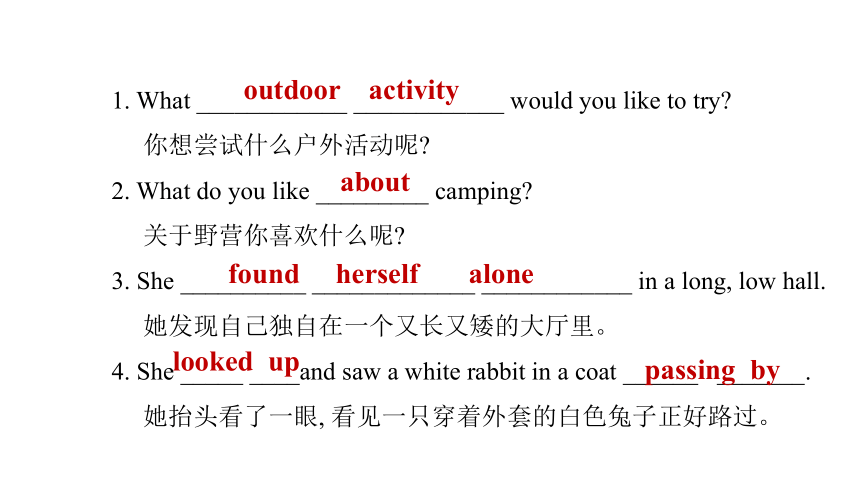
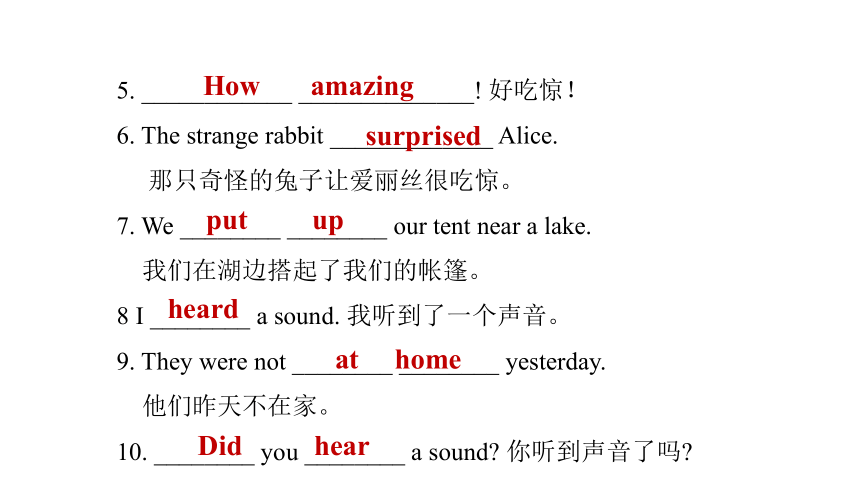
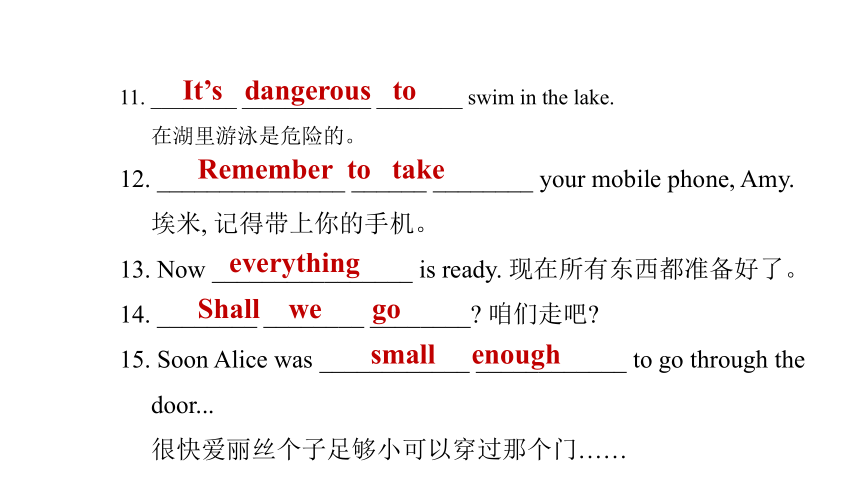
文档简介
(共86张PPT)
牛津译林版七年级下册
Unit 6 Outdoor fun
1. hurry vi. 匆忙, 急忙
2. that adv. 那么, 那样
3. camping n. 野营
4. riding n. 骑马
5. skating n. 溜冰→ _________v. 溜冰; 滑冰
6. ride vt. 骑(马、自行车等)
7. outside adv. 在外面
8. rabbit n. 兔, 家兔
9. hole n. 洞
10. pass vi. & vt. 经过; 通过
skate
11. by prep. 在……旁边, 靠近 adv. 经过
12. dear excl. 哎呀, 天哪
13. watch n. 手表
14. fall vi. 落下, 掉落; 倒
15. hit vt. 到达; 击中, 撞
16. herself pron. 她自己
17. alone adj. & adv. 单独, 独自
18. low adj. 低的, 矮的
19. locked adj. 锁上的
20. notice vt. 注意, 察觉
21. into prep. 到……里面
22. side n. 侧, 边
23. through prep. 通过, 穿过
24. surprise vt. 使惊奇, 使措手不及
25. wood n. 木头, 木材
26. period n. 一段时间, 时期
27. century n. 世纪, 百年
28. become linking v. 开始变得; 变成
29. excited adj. 激动的
→ ___________adj. 令人兴奋的; 使人激动的
exciting
30. sweet adj. 甜的
31. enough adv. 足够地, 充分地
32. decide vt. & vi. 决定
33. enter vt. 进入
34. towards prep. 向, 朝
35. forget vi. & vt. 忘记
36. reach vt. 伸手(脚) 够到
37. climb vi. & vt. 爬, 攀登
38. fail vi. & vt. 失败
1. ____________________快点, 赶快
2. ____________________去野营
3. ____________________去骑马
4. ____________________向上看
5. ____________________路过, 经过
6. ____________________起立, 站起来
7. ____________________离开; 逃离
8. ____________________通过
9. ____________________周围
hurry up
go camping
go riding
look up
pass by
stand up
get away
go through
all around
10. ____________________把……放进……
11. ____________________ 从……中拿出……
12. ____________________追赶; 追逐
13. ____________________跳下去
14. ____________________击到地上
15. ____________________发现自己一个人
16 _____________________在另一侧
17. ____________________搭, 竖立
18. ____________________在家
put...into...
take...out of...
run across
jump down
hit the ground
find oneself alone
on the other side
put up
at home
19.____________________________野营
20. ____________________________手机
21. ____________________________从那时起
22. ____________________________用木头做一只鸟
23. ____________________________用竹子做风筝
24. ____________________________在13 世纪
25. ____________________________ ……因……而变得出名
26. ____________________________野餐
27. ____________________________等等; 诸如此类
mobile phone
from then on
make a bird out of wood
use bamboo to make kites
In the 13th century
Become famous for
have a picnic
and so on
the camping trip
28. _______________________少许, 一点
29. _______________________尝起来甜的
30. _______________________感觉有点不舒服
31. _________________________________向门口走去
32. _________________________________攀爬
33. _________________________________变得越来越小
a little
taste sweet
feel a little ill
walk towards the door
climb up
become smaller and smaller
1. What ____________ ____________ would you like to try
你想尝试什么户外活动呢
2. What do you like _________ camping
关于野营你喜欢什么呢
3. She __________ _____________ ____________ in a long, low hall.
她发现自己独自在一个又长又矮的大厅里。
4. She _____ ____and saw a white rabbit in a coat ______ _______.
她抬头看了一眼, 看见一只穿着外套的白色兔子正好路过。
outdoor activity
about
found herself alone
looked up
passing by
5. ____________ ______________! 好吃惊!
6. The strange rabbit _____________ Alice.
那只奇怪的兔子让爱丽丝很吃惊。
7. We ________ ________ our tent near a lake.
我们在湖边搭起了我们的帐篷。
8 I ________ a sound. 我听到了一个声音。
9. They were not ________ ________ yesterday.
他们昨天不在家。
10. ________ you ________ a sound 你听到声音了吗
surprised
put up
heard
at home
Did hear
How amazing
11. ________ ____________ ________ swim in the lake.
在湖里游泳是危险的。
12. _______________ ______ ________ your mobile phone, Amy.
埃米, 记得带上你的手机。
13. Now ________________ is ready. 现在所有东西都准备好了。
14. ________ ________ ________ 咱们走吧
15. Soon Alice was ____________ ____________ to go through the door...
很快爱丽丝个子足够小可以穿过那个门……
Remember to take
everything
Shall we go
small enough
It’s dangerous to
行为动词的一般过去时的肯定句、否定句、一般疑问句及其肯、否定回答。具体构成如下:
1) 肯定句: 主语+ 动词(过去式) + 其他.
e.g. They had a picnic in the park last week.
上周他们在公园里野餐。
2) 否定句: 主语+did not+ 动词( 原形) + 其他. (did not= didn’t)
e.g. We didn’t have classes yesterday. 我们昨天没有课。
考点1
一般过去时( 二)
(3) 一般疑问句:Did+ 主语+ 动词(原形) + 其他?
肯定回答:Yes, 主语(或相应的人称代词) +did.
否定回答:No, 主语(或相应的人称代词) +didn’t.
e.g. —Did Amy finish her homework on time
埃米按时完成她的家庭作业了吗?
—Yes, she did. / No, she didn’t.
是的, 她按时完成了。/ 不, 她没有。
中考在线:—Have you ever visited Shenyang EXPO Garden
—Yes. I _______ it last year.
A. have visited B. will visit
C. visited D. visit
C
【解析】本题用语法判定法。考查动词时态。句意:—你曾经参观过沈阳世博园吗?—是的,我去年参观它的。由答句中“last year”可知,答句是一般过去时。故选C。
中考在线:—Alice has gone out.
—Oh, has she What time ______ she ______
A. has; gone B. will; go
C. did; go D. is; going
【解析】本题用语法判定法。考查动词时态。句意:—爱丽丝已经出去了。—哦,是吗?她什么时候出去的?根据语境,Alice 出去的动作发生在过去,what time 表示的是时间点。故选C。
C
be 动词的一般过去时的肯定句、否定句、一般疑问句及其肯、否定回答。
具体构成如下:
(1) 肯定句: 主语+be(was, were) + 其他.
e.g. He was very busy last week. 上周他很忙。
(2) 否定句: 主语+be(was, were) + not+ 其他.
(was not= wasn’t; were not= weren’t)
e.g. Helen wasn’t at home yesterday.
海伦昨天没在家。
(3) 一般疑问句:Be(Was, Were) + 主语+ 其他?
肯定回答:Yes, 主语(或相应的人称代词) +be(was, were).
否定回答:No, 主语(或相应的人称代词) +be(was, were) +not.
e.g. —Were they worried about their work
他们担心他们的工作吗?
—Yes, they were. / No, they weren’t.
是的, 他们担心。/ 不, 他们不担心。
中考在线:—My feelings for you have not changed.
—But you have changed. You are not as you _____.
A. are B. were
C. will be D. have been
【解析】考查动词时态。根据答语的前句句意“但是你已经变了”可知,后句表述“你不像你以前那样了”,用一般过去时。故选B。
B
1. Just now, he got a call and _________ (hurry) home.
2. Miss Li _________ (teach) Chinese in London 3 years ago.
3. I _________ (go) swimming last Sunday, and I _________ (not go) shopping.
4. When I _________ (be) a child, I often _________ (listen) to music.
一、用所给词的适当形式填空
hurried
taught
went didn’t go
was listened
Hurry up
hurry /'h ri/ vi. 匆忙,急忙
e.g. When she finished her work, she had to hurry home and looked after her son.
她完成工作后就得赶紧回家照顾她儿子。
She hurried to school to tell them the news.
她匆忙地回学校告诉他们这则消息。
考点1
中考在线:—It’s already 7:50. If you want to get to the meeting on time, you must _______, Jack.
—I see. I’ll walk quickly.
A. hurry up B. ring up C. stay up
A
【解析】考查动词短语辨析。hurry up 快点;ring up 打电话给……;stay up 熬夜。根据答语“I’ll walk quickly (我会走快点)”可知,前者是催促后者“快点”,故选A。
complain
complain /k m'ple n/ vt.& vi. 抱怨
e.g. The American couple complained about the high cost of visiting Europe.
complain to sb. (about/of sth. ) 向某人抱怨(某事) You can complain to your mother (about your old schoolbag).
你可以向你的妈妈抱怨(你的旧书包)。
complain+that 引导的从句 抱怨…… Helen complained that the exam was too difficult. 海伦抱怨考试太难了。
中考在线:More and more students _______ too much homework and they are really tired of it.
A. complain about B. care about
C. learn about D. hear about
【解析】complain about 抱怨; care about 介意, 关心;learn about 得知,获悉;hear about 听说;complain about too much homework 抱怨太多的家庭作业, 符合题意。
A
too much 太多
e.g. You worry too much. 你担心得太多了。
速记小法:巧辨too much, too many与 much too:
too much 与much too,用法区别看后头;
much 后名词不可数,too 则可接形或副;
too many 要记住,其后名词必复数。
辨析: too much, too many 与much too
too much 太多,过多 修饰不可数名词 too much rain 太多雨水
指代不可数名词 have too much to do
要做的事太多
相当于副词, 修饰动词 worry too much 担心太多
too many 太多,过多 修饰可数名词复数 too many books 太多的书
much too 太 修饰形容词或副词 much too expensive 太贵了
中考在线:My cousin is _______ heavy because he often eats _______ fast food.
A. too much; too many B. too many; too much
C. much too; too much D. too much; much too
【解析】本题用词语应用法。句意:我的堂弟太重了因为他经常吃很多快餐。much too 修饰形容词或副词,但不修饰动词,too much 修饰不可数名词, too many 修饰可数名词复数。第一空修饰形容词heavy 用much too; 第二空修饰不可数名词fast food 用too much。
C
camping.
camping /'k mp / n. 野营
e.g. I want to have a camping trip.
我想进行一次野营旅行。
We go camping every summer.
我们每年夏天都去野营。
camp 的名词形式
go+v.-ing 形式,表示进行某种活动,其他同类结构短语:
go cycling 去骑自行车
go skating 去滑冰
go swimming 去游泳
go skiing 去滑雪
1. Don’t _________(急忙). There’s plenty of time.
2. It’s my idea to hold the party _________(在外面) the house.
3. On the _________(野营) holiday, we took turns at cooking.
4. He is learning to _________(骑) a bicycle.
5. Some schools also teach swimming and _________(滑冰).
一、根据句意及汉语提示完成句子
hurry
outside
camping
ride
skating
6. Eddie wants to go riding. (改为同义句)
Eddie _________ _________ _________ go riding.
7. Jack can carry that heavy bag for me. (对画线部分提问)
_________ can carry that heavy bag for you
8. They are talking about going skating. (对画线部分提问)
_________ are they talking about
9. If you don’t hurry, you’ll be late for school. (改为同义句)
_________ _________, or you’ll be late for school.
二、根据要求改写句子,每空一词
would like to
Who
What
Hurry up
in a coat .
in a coat 穿着外套
e.g. Who’s that girl in a red skirt
那个穿红裙子的女孩子是谁?
=in red
“in +颜色”表示穿什么
颜色的衣服
中考在线:Big sale! We have T-shirts ______ white ______ only $ 6.
A. in; for B. of; for C. in; at
A
pass by 经过
e.g. I see them pass by my house every day.
我看见他们每天从我家经过。
Please pass me the spoon. =pass the spoon to me.
请递给我汤匙。
When I walked past the cinema, I saw Jim.
当我走过电影院的时候,我看到了吉姆。
pass 的过去式为passed
pass sb. sth.=pass sth. to sb.
意为“把某物传(递) 给某人”
passed 的同音词为past。
by 的用法
词性 含义 示例
adv. 经过 He hurried by without a word.
他匆匆地过去没有说一句话。
prep. 在……旁边 Tom is sitting by the window.
汤姆正坐在窗户旁边。
通过 You can order tickets by telephone.
你可以用电话订票。
乘…… Are you going there by bike or by bus
你骑车还是坐公交车去那里?
中考在线2:The children here improve their English _______ listening and speaking every day.
A. on B. through C. with D. by
【解析】考查介词的用法。句意:这里的孩子每天通过听、说来提高他们的英语。此处的介词by 意为“通过;凭借;用”,后跟动词的-ing 形式。故选D。
D
get away
get away 逃脱; 离开
e.g. I am afraid I can’t get away from the meeting.
我恐怕难以从会议中抽身。
How can we get away from the city
我们怎样才能离开这个城市呢?
He has been away from school for a month.
他已经离开学校一个月了。
fell ; hit
fall /f l/ vi. 落下, 掉落; 倒
e.g. Don’t fall off the bike.
不要从自行车上掉下去。
fall—fell—fallen
fall 的常用短语:
① fall behind 落在……后面② fall asleep 睡着,入睡
③ fall off 从……掉下来
中考在线:假如你沉迷于玩电脑游戏,你将落后于其他人。
You will ________________ others if you are crazy about _______________________.
fall behind
computer games
hit /h t/ vt. 击中, 撞
e.g. A terrible snowstorm hit that small town last night.
昨天晚上, 一场可怕的暴风雪袭击了那个小镇。
hit sb. on the nose 打某人的鼻子
hit sb. in the face 打某人的脸
hit sb. in the eye 打某人的眼睛
hit—hit—hit
该短语中的the 不能用形容词性物主代词代替哦!
hit+sb.+ on/in+the+具体部位
on 后接硬的或突出的部位
in 后接软的或中空的部位
alone
alone / 'l n/ adj. & adv. 独自, 单独
e.g. The old man was alone in the car.
这位老人独自在车里。
The old man lives alone.
= The old man lives by himself.
= The old man lives on his own.
那位老人独自居住。
alone
=by oneself
=on one’s own
中考在线:We are not __________ (独自) on the Great Way and the whole world is one family.
【解析】句意:我们在伟大的道路上并不孤单,整个世界是一个大家庭。alone意为“独自”,形容词,作表语。故填alone。
alone
辨析:alone 与lonely
alone 既可用作形容词也可作副词,指的是客观情况,不含感彩。
lonely 只用作形容词,表示“孤独的;寂寞的”,带有浓厚的感彩,强调精神上的孤独。
一语辨异:The old man lived alone in a lonely village, but he didn’t feel lonely. 那个老人独自居住在一个偏僻的村子里,但他并不感到孤独。
中考在线:Emma felt ________ when her parents were on business trips.
A. sadly B. angrily
C. unfortunately D. lonely
【解析】句意:当艾玛的父母在出差时,艾玛感觉孤单。feel 后面加形容词, lonely 是形容词。sadly 悲伤地,angrily 生气地, unfortunately 不幸地,都是副词。故选D。
D
locked.
locked /l kt/ adj. 锁上的
e.g. Can you open the locked door
你能打开这扇锁着的门吗?
Did you lock the door 你锁好门了吗?
On my way home, I bought a lock.
回家的路上, 我买了一把锁。
noticed
notice /'n t s/ vt. 注意, 察觉
e.g. Nobody could notice them.
He didn’t notice me enter the room.
与notice 用法相同的词有:
watch, see, hear 等。
notice 的相关用法:
①notice sb. doing sth. 注意到某人正在做某事
(表示动作正在进行)
②notice sb. do sth.注意到某人做某事
(表示全过程)
tried
try /tra / v. 试图, 努力;试验
e.g. We should try to study hard. 我们应该设法努力学习。
与try 相关的词组: ① try on 试穿
② try one’s luck 碰运气
③ try out 试验
④ try one’s best (=do one’s best) 尽某人最大的努力
辨析:try to do sth. 与try doing sth.
try to do sth. 努力做某事,强调付出努力但不一定成功。
try doing sth. 尝试做某事,含有看结果如何之意。
through /θru / prep. 通过, 穿过
e.g. The sunlight comes in through the glass.
The two hunters are walking through the forest.
through 常与go, walk 等动词连用
辨析:through, across, over 与past
through 介词,“穿过,通过”, 强调从某个立体空间内穿过。
across 介词,“横过”, 强调从某个平面的一边到另一边。
over 介词,“穿越,翻越”, 强调从某物的正上面跨越。
past 介词,“经过”, 强调从某建筑物的旁边经过。
e.g. There is a river through the city.
有一条河穿过这座城市。
Walk across the bridge, and you’ll see a tree.
走过那座桥,你会看见一棵树。
The cat jumps over the wall to play every day.
每天这只猫都跳过墙去玩。
He is walking past the post office.
他正从邮局旁边经过。
中考在线:—Look, there is a cute bird, Mom.
—It flew into our kitchen ____ the window just now, Alex.
A. across B. through
C. above D. under
【解析】考查介词辨析。句意:—快看妈妈,那有一只可爱的小鸟。—Alex,它是刚才通过窗户飞进我们厨房的。above 在物体的上方;under 在物体的下面。先排除C、D 两项。across 指的是从物体的表面穿过,而through指的是从物体的内部穿过。结合语境,小鸟穿过窗户,故选B。
B
1. My younger sister is old enough to dress h .
2. The leaves begin to f when autumn comes.
3. The heavy snow h our hometown last night.
4. Did you n him wearing a red shirt today
5. My son has a r as a pet at home.
一、根据句意及首字母提示完成句子
erself
all
it
otice
abbit
6. There isn’t a cloud in the sky. It’s going to be _________(sun) tomorrow.
7. Alice saw a white dog _________(pass) by.
8. Don’t go _________(cross) the road. It’s too dangerous.
9. She _________(lock) the front door and went outside.
10. My father had two _________(watch), so he gave me one.
二、用所给单词的适当形式填空
sunny
passing
across
locked
watches
put up
put up 张贴, 挂起, 举起,搭建
e.g. I mean we have to put up the lights and Christmas balls.
我的意思是我们必须挂起这些灯和圣诞球。
put on 穿,戴 He put on a sweater and went out.
put ... away 把……收起来 Put your toys away.
put down 放下;记下 Put down your name and address.
put off 推迟,延期 What bad weather! The flight will be put
off to 8 o’clock this evening. 多么糟糕的天气!
航班将被推迟到今天晚上8 点钟。
put out 熄灭,扑灭 They put out the fire with the help of the
firemen. 在消防员的帮助下,他们扑灭了火。
中考在线:—Jim, please help me _______ the tent.
—OK. I’m coming. It’s exciting to sleep in it tonight.
A. get on B. get off C. pull down D. put up
wood
wood /w d/ n. 木头, 木材
e.g. Desks are made of wood. 桌子是用木头做成的。
Snow White runs into the woods.
白雪公主逃进了森林里。
The second floor is a wooden floor.
二楼是木地板地面。
wood(n.)
adj.
wooden
木制的
中考在线:I never take __________ /'w dn/ chopsticks when I buy takeaway food.
wooden
became ;from then on.
become /b 'k m/ linking v. 开始变得, 变成
e.g. The sky becomes cloudy. 天空变得多云了。
She looks young for her years.
连系动词,后面常接名词、形容词
类似become 的连系动词还有:
look, feel, get,
keep, seem, sound,
taste, turn 等。
from then on 从那时起
辨析: from now on 与from then on
from now on 从现在起, 通常与一般将来时连用。
from then on 从那时起, 通常与一般过去时连用。
excited.
excited / k'sa t d/ adj. 激动的
e.g. He was too excited to say a word.
他激动得一句话也说不出来。
-ed修饰人,-ing修饰物。
辨析: excited 与exciting
excited 兴奋的;激动的。指人对……感到兴奋, 主语通常是人。
exciting 令人兴奋的;使人激动的。指事物本身令人兴奋、激动。常用于修饰物。
中考在线2:The ______ news made him _______. He didn’t fall asleep until midnight.
A. excited; excited B. exciting; exciting
C. exciting; excited D. excited; exciting
【解析】本题用词义辨析法。考查形容词辨析。句意:这个激动人心的消息让他很兴奋。他直到半夜才睡着。excited 兴奋的, 激动的, 修饰人, 表示人的感受;exciting 令人兴奋的, 使人激动的, 修饰物, 说明事物本身具有的特点;本句中前面的被修饰词为news, 选择exciting, 第二空使用excited 修饰him。故选C。
C
Me too.
me too 我也一样
e.g. —I like potato chips.
我喜欢薯条。
—Me too. 我也是。
—I’m glad it’s Friday.
我很高兴今天是星期五。
—Us too! 我们也高兴!
“Me too.”主要用于延续前面的肯定信息。
1. We can use __________ (木材) to make paper.
2. He will go on a trip for a __________ (一段时间).
3. Jack felt very __________ (激动的) when he opened his Christmas present.
4. I wanted to say hello to him but I __________ (忘记) his name.
一、根据汉语提示完成句子
wood
period
excited
forgot
a little.
a little 一点, 少许
e.g. My mother felt a little ill after supper.
晚饭后, 我的妈妈感觉有点不舒服。
I feel a little tired.
我感觉有点儿累。
He is a little better today.
他今天健康情况好一些了。
a little + 形容词原级
a little
+ 形容词比较级
难点&辨析:little, few, a little 与a few
little 意为“不多的”,修饰不可数名词, 表示否定意义。
意为“小的”,修饰名词。
few 意为“很少;不多”,修饰可数名词复数,表示否定意义。
a little 意为“一点”,修饰不可数名词,表示肯定意义。
a few 意为“一些”,修饰可数名词复数, 表示肯定意义。
一语辨异:
He asked me for a little ink, but I had little myself.
他向我要一点墨水,可我自己也没多少了。
I have a few good friends, but few of them live in this city.
我有几个好朋友,但是他们几乎都不住在这个城市。
e.g. There is little water in the cup. 杯子里几乎没有水。
There is a little bird by the river. 河边有一只小鸟。
There are few people in the cinema. 电影院里几乎没有人。
中考在线:There is _______ milk in the fridge, is there
A. few B. a few C. little D. a little
C
【解析】本题用语法判定法。考查词语辨析。句意:冰箱里几乎没有牛奶,是吗 由题干可知,这是一个反意疑问句,根据疑问部分is there 可知,疑问部分是肯定的,则陈述部分应是否定的,可排除B 项和D 项;又根据句中主语milk是不可数名词可知,用little 修饰,故选C。
some more.
some more 更多一些
e.g. Would you like some more tea
some more days
five more days
some more+un.
some more+cn. (复数)
more 前也可以是具体数字
another 也有类似的表达,但要放在数字之前。如another two weeks 再有两周
中考在线:要买那辆新自行车,他还需要一些钱。
He needs ______________ money to buy the new bike.
some more
smaller and smaller.
smaller and smaller 越来越小
e.g. The balloon is becoming smaller and smaller.
Our city is becoming more and more beautiful.
中考在线:—I’m proud of Ezhou, our homeland.
—So am I. It is becoming ______.
A. more and more beautifully B. more beautiful and beautiful
C. more and more beautiful D. more beautifully and beautifully
形容词比较级+and+ 形容词比较级
多音节形容词可用“more and more + 形容词”来表示
C
decided
decide /d 'sa d/ vt. & vi. 决定
e.g. They decided to live in London.
他们决定住在伦敦。
John decided to listen carefully in class.
=John made up his mind to listen carefully in class.
约翰决定课堂上认真听讲。
decide to do sth. 决定做某事
decide to do sth.=make up one’s mind to do sth.
decide(v.)
n. decision
decide+ n. / 代
decide to do sth.
decide +that 从句
enter /'ent (r)/ vt. 进入
e.g. She entered the room and closed the door.
她进了房间,关上了门。
In our country, children enter school at the age of six.
在我国,孩子们六岁上学。
You can’t enter her room rudely.
你不能粗暴地闯入她的房间。
enter 表示进入一个具体场所或加入某个组织而成为其中一员时,后面无需加介词。
enter
towards
towards /t 'w dz/ prep. 向;朝
e.g. I saw her walking towards the bank.
我看到她朝银行走去。
辨析:towards 与to
相同点 不同点
to 都指“朝,向” to 往往带有“已达某地”的意味,它的宾语指的是此次行程的(目的地)
towards towards 只是单纯地表方向
中考在线:—I’m proud of our China’s Tiangong Station plan.
—Me too. We have taken another step _______ our space dream.
A. behind B. towards C. across D. besides
【解析】考查介词的用法。句意:—我为我们中国的天宫站计划感到骄傲。—我也是。我们向太空梦想又迈进了一步。towards 意为“朝,向”,与句意一致。故选B。
B
too ... to
too... to... 太……而不能……
e.g. He is too young to go to school by himself.
The problem is too difficult for me to work out.
=The problem is so difficult that I can’t work it out.
=The problem isn’t easy enough for me to work out.
too+ adj.(+for sb.)+to do sth.(对某人来说) 太……而不能做某事
=not+adj.+enough+to do sth.
=so +adj.+that引导的从句(从句用否定形式)
中考在线:The man in blue is _______ old to finish the difficult task in such a short time.
A. too B. very C. so D. such
【解析】本题用固定搭配法。考查固定用法。句意:穿蓝衣服的那个人太老了,以至于不能在这么短的时间内完成这项艰巨的任务。此处用到固定短语too...to... 表示“太……而不能”。故选A。
A
reach /ri t / vt. 伸手(脚) 够到;到达
e.g. The little girl can’t reach the apples on the table.
那个小女孩够不到桌上的苹果。
辨析:get, arrive 与reach
get 不及物动词,常和介词to 连用。但当到达的地点为副词(here, there, home) 时,to 要省略。
arrive 不及物动词, 可单独使用,后面接地点时,必须有介词at(小地方)/ in(大地方)。
reach 及物动词,后面可直接跟地点名词。
e.g. I got home late last night. 昨晚我到家晚了。
He will arrive in Beijing in an hour. 一个小时后他将到达北京。
When did you arrive 你什么时候到的?
This train reaseches London at five. 这班列车5 点到达伦敦。
中考在线:With the help of the Internet, information can _______ every corner of the world quickly.
A. get B. raise C. reach D. turn
【解析】本题用词义辨析法。句意:在互联网的帮助下,信息可以迅速到达世界的每个角落。get 得到;raise 抚养,筹集;reach 到达,触及;turn 转变。由句意可知选C。
C
failed
fail /fe l/ vi.& vt. 失败;不及格
e.g. I don’t think you will fail in the exam.
我认为你将不会考试不及格。
He failed to pass the driving test.
他未能通过驾照考试。
failure(n.)
fail in+n.
在某方面失败
fail to do sth. 未能成功做某事
本单元话题是户外活动。
典例:
假如你是李梅。你的美国笔友 Tom 在昨天的 e-mail 中告诉你,最近他对中国文化产生了浓厚的兴趣,希望你能给他介绍一些经典故事。请你根据下面所给图画,给 Tom 回复一封 e-mail,向他讲述这一经典故事,并希望知道他对该故事及主人公的看法。
单元话题
Sima Guang hit the tank(缸)
play hide and seek
(捉迷藏), full of water
think over, pick up, throw at
fall into, be frightened (惊恐的), cry, run for help
break, be saved
要求:
1. 文章需包括所有图画的内容,可以适当发挥,使全文连贯;
2. 文中不得出现可能透露考生真实身份的任何信息;
3. 100 词左右(邮件的开头、结尾已给出,不计入总词数) 。
Dear Tom,
I’m very happy that you are interested in traditional Chinese stories. Well, let me tell you a famous one with the name “Sima Guang hit the tank”.
_____________________________________
______________________________________________________
I am looking forward to hearing from you.
Yours,
Li Mei
审题指导
在叙述故事时,首先要选好叙述的角度,是第一人称还是第三人称,从谁的视角来叙述故事,一旦选定不要更换。时态上,一般选择过去时,选定后全篇一般都用过去时。
写作方法
“5W 法”写故事
在叙述故事时,从who(人物),when(时间),where(地点),what(事件),why(原因) 等方面来展开。
●易错点提示
注意人称和时态的变化
写作模板
“5W 法” 写故事 交代时间、 地点、人物 Well, let me tell you …
叙述事件 经过 Once ... There was a ... When ... However, ... He thought it over and ... He ..., .... The kid was saved.
收尾句(结果/评价/感受) What do you think of ...
经典词句
单词 hurry, fall, notice, side, pass, excited, cry, reach, fail
短语 pass by, get away, all around, hit the ground, be full of, cry for help, on one’s way to
句式 1. He looked up and saw...passing by.
2. It’s dangerous to...
3. What do you think of...
范文赏析
Dear Tom,
I’m very happy that you are interested in traditional Chinese stories. Well, let me tell you a famous one with the name “Sima Guang hit the tank”.
Once Sima Guang was playing hide and seek with several children in the backyard. There was a large water tank in the yard. It was full of water.
When the kids were playing, one child accidentally fell into the tank. Other children were so frightened that they started to run, crying for help. However, Sima Guang was different. He thought it over and then he had an idea. He picked up a big stone and threw it at the tank. “Bang!”, the tank broke and the water ran out. The kid was saved.
Do you like the story What do you think of Sima Guang
I am looking forward to hearing from you.
Yours,
Li Mei
名师点评
本文运用“5W 法”叙述了司马光砸缸的故事。
who: Sima Guang;
when: once;
where: in the backyard;
what: picked up a big stone and threw it at the tank;
why: one child accidentally fell into the tank
One day, Alice sat by a river with her sister. Then she found a rabbit in a coat ___________16 (pass) by. Alice felt very ____________17 (惊讶的), so she stood up and r 18 after the rabbit. Suddenly the rabbit jumped into a big hole and Alice jumped down too. After some time in the hole, she n 19 a bottle on the table.
单元知识浓缩
passing
surprised
an
oticed
She drank a little liquid(液体) in it, and then her body became _________ 20 (small) and smaller. And she was small enough to go t 21 the door, so she __________22 (决定) to go into the garden. She walked t 23 the door, but she f 24 about the key. When she came back to the table, she ________25 (失败) to reach the key.
smaller
hrough
decided
owards
orgot
failed
牛津译林版七年级下册
Unit 6 Outdoor fun
1. hurry vi. 匆忙, 急忙
2. that adv. 那么, 那样
3. camping n. 野营
4. riding n. 骑马
5. skating n. 溜冰→ _________v. 溜冰; 滑冰
6. ride vt. 骑(马、自行车等)
7. outside adv. 在外面
8. rabbit n. 兔, 家兔
9. hole n. 洞
10. pass vi. & vt. 经过; 通过
skate
11. by prep. 在……旁边, 靠近 adv. 经过
12. dear excl. 哎呀, 天哪
13. watch n. 手表
14. fall vi. 落下, 掉落; 倒
15. hit vt. 到达; 击中, 撞
16. herself pron. 她自己
17. alone adj. & adv. 单独, 独自
18. low adj. 低的, 矮的
19. locked adj. 锁上的
20. notice vt. 注意, 察觉
21. into prep. 到……里面
22. side n. 侧, 边
23. through prep. 通过, 穿过
24. surprise vt. 使惊奇, 使措手不及
25. wood n. 木头, 木材
26. period n. 一段时间, 时期
27. century n. 世纪, 百年
28. become linking v. 开始变得; 变成
29. excited adj. 激动的
→ ___________adj. 令人兴奋的; 使人激动的
exciting
30. sweet adj. 甜的
31. enough adv. 足够地, 充分地
32. decide vt. & vi. 决定
33. enter vt. 进入
34. towards prep. 向, 朝
35. forget vi. & vt. 忘记
36. reach vt. 伸手(脚) 够到
37. climb vi. & vt. 爬, 攀登
38. fail vi. & vt. 失败
1. ____________________快点, 赶快
2. ____________________去野营
3. ____________________去骑马
4. ____________________向上看
5. ____________________路过, 经过
6. ____________________起立, 站起来
7. ____________________离开; 逃离
8. ____________________通过
9. ____________________周围
hurry up
go camping
go riding
look up
pass by
stand up
get away
go through
all around
10. ____________________把……放进……
11. ____________________ 从……中拿出……
12. ____________________追赶; 追逐
13. ____________________跳下去
14. ____________________击到地上
15. ____________________发现自己一个人
16 _____________________在另一侧
17. ____________________搭, 竖立
18. ____________________在家
put...into...
take...out of...
run across
jump down
hit the ground
find oneself alone
on the other side
put up
at home
19.____________________________野营
20. ____________________________手机
21. ____________________________从那时起
22. ____________________________用木头做一只鸟
23. ____________________________用竹子做风筝
24. ____________________________在13 世纪
25. ____________________________ ……因……而变得出名
26. ____________________________野餐
27. ____________________________等等; 诸如此类
mobile phone
from then on
make a bird out of wood
use bamboo to make kites
In the 13th century
Become famous for
have a picnic
and so on
the camping trip
28. _______________________少许, 一点
29. _______________________尝起来甜的
30. _______________________感觉有点不舒服
31. _________________________________向门口走去
32. _________________________________攀爬
33. _________________________________变得越来越小
a little
taste sweet
feel a little ill
walk towards the door
climb up
become smaller and smaller
1. What ____________ ____________ would you like to try
你想尝试什么户外活动呢
2. What do you like _________ camping
关于野营你喜欢什么呢
3. She __________ _____________ ____________ in a long, low hall.
她发现自己独自在一个又长又矮的大厅里。
4. She _____ ____and saw a white rabbit in a coat ______ _______.
她抬头看了一眼, 看见一只穿着外套的白色兔子正好路过。
outdoor activity
about
found herself alone
looked up
passing by
5. ____________ ______________! 好吃惊!
6. The strange rabbit _____________ Alice.
那只奇怪的兔子让爱丽丝很吃惊。
7. We ________ ________ our tent near a lake.
我们在湖边搭起了我们的帐篷。
8 I ________ a sound. 我听到了一个声音。
9. They were not ________ ________ yesterday.
他们昨天不在家。
10. ________ you ________ a sound 你听到声音了吗
surprised
put up
heard
at home
Did hear
How amazing
11. ________ ____________ ________ swim in the lake.
在湖里游泳是危险的。
12. _______________ ______ ________ your mobile phone, Amy.
埃米, 记得带上你的手机。
13. Now ________________ is ready. 现在所有东西都准备好了。
14. ________ ________ ________ 咱们走吧
15. Soon Alice was ____________ ____________ to go through the door...
很快爱丽丝个子足够小可以穿过那个门……
Remember to take
everything
Shall we go
small enough
It’s dangerous to
行为动词的一般过去时的肯定句、否定句、一般疑问句及其肯、否定回答。具体构成如下:
1) 肯定句: 主语+ 动词(过去式) + 其他.
e.g. They had a picnic in the park last week.
上周他们在公园里野餐。
2) 否定句: 主语+did not+ 动词( 原形) + 其他. (did not= didn’t)
e.g. We didn’t have classes yesterday. 我们昨天没有课。
考点1
一般过去时( 二)
(3) 一般疑问句:Did+ 主语+ 动词(原形) + 其他?
肯定回答:Yes, 主语(或相应的人称代词) +did.
否定回答:No, 主语(或相应的人称代词) +didn’t.
e.g. —Did Amy finish her homework on time
埃米按时完成她的家庭作业了吗?
—Yes, she did. / No, she didn’t.
是的, 她按时完成了。/ 不, 她没有。
中考在线:—Have you ever visited Shenyang EXPO Garden
—Yes. I _______ it last year.
A. have visited B. will visit
C. visited D. visit
C
【解析】本题用语法判定法。考查动词时态。句意:—你曾经参观过沈阳世博园吗?—是的,我去年参观它的。由答句中“last year”可知,答句是一般过去时。故选C。
中考在线:—Alice has gone out.
—Oh, has she What time ______ she ______
A. has; gone B. will; go
C. did; go D. is; going
【解析】本题用语法判定法。考查动词时态。句意:—爱丽丝已经出去了。—哦,是吗?她什么时候出去的?根据语境,Alice 出去的动作发生在过去,what time 表示的是时间点。故选C。
C
be 动词的一般过去时的肯定句、否定句、一般疑问句及其肯、否定回答。
具体构成如下:
(1) 肯定句: 主语+be(was, were) + 其他.
e.g. He was very busy last week. 上周他很忙。
(2) 否定句: 主语+be(was, were) + not+ 其他.
(was not= wasn’t; were not= weren’t)
e.g. Helen wasn’t at home yesterday.
海伦昨天没在家。
(3) 一般疑问句:Be(Was, Were) + 主语+ 其他?
肯定回答:Yes, 主语(或相应的人称代词) +be(was, were).
否定回答:No, 主语(或相应的人称代词) +be(was, were) +not.
e.g. —Were they worried about their work
他们担心他们的工作吗?
—Yes, they were. / No, they weren’t.
是的, 他们担心。/ 不, 他们不担心。
中考在线:—My feelings for you have not changed.
—But you have changed. You are not as you _____.
A. are B. were
C. will be D. have been
【解析】考查动词时态。根据答语的前句句意“但是你已经变了”可知,后句表述“你不像你以前那样了”,用一般过去时。故选B。
B
1. Just now, he got a call and _________ (hurry) home.
2. Miss Li _________ (teach) Chinese in London 3 years ago.
3. I _________ (go) swimming last Sunday, and I _________ (not go) shopping.
4. When I _________ (be) a child, I often _________ (listen) to music.
一、用所给词的适当形式填空
hurried
taught
went didn’t go
was listened
Hurry up
hurry /'h ri/ vi. 匆忙,急忙
e.g. When she finished her work, she had to hurry home and looked after her son.
她完成工作后就得赶紧回家照顾她儿子。
She hurried to school to tell them the news.
她匆忙地回学校告诉他们这则消息。
考点1
中考在线:—It’s already 7:50. If you want to get to the meeting on time, you must _______, Jack.
—I see. I’ll walk quickly.
A. hurry up B. ring up C. stay up
A
【解析】考查动词短语辨析。hurry up 快点;ring up 打电话给……;stay up 熬夜。根据答语“I’ll walk quickly (我会走快点)”可知,前者是催促后者“快点”,故选A。
complain
complain /k m'ple n/ vt.& vi. 抱怨
e.g. The American couple complained about the high cost of visiting Europe.
complain to sb. (about/of sth. ) 向某人抱怨(某事) You can complain to your mother (about your old schoolbag).
你可以向你的妈妈抱怨(你的旧书包)。
complain+that 引导的从句 抱怨…… Helen complained that the exam was too difficult. 海伦抱怨考试太难了。
中考在线:More and more students _______ too much homework and they are really tired of it.
A. complain about B. care about
C. learn about D. hear about
【解析】complain about 抱怨; care about 介意, 关心;learn about 得知,获悉;hear about 听说;complain about too much homework 抱怨太多的家庭作业, 符合题意。
A
too much 太多
e.g. You worry too much. 你担心得太多了。
速记小法:巧辨too much, too many与 much too:
too much 与much too,用法区别看后头;
much 后名词不可数,too 则可接形或副;
too many 要记住,其后名词必复数。
辨析: too much, too many 与much too
too much 太多,过多 修饰不可数名词 too much rain 太多雨水
指代不可数名词 have too much to do
要做的事太多
相当于副词, 修饰动词 worry too much 担心太多
too many 太多,过多 修饰可数名词复数 too many books 太多的书
much too 太 修饰形容词或副词 much too expensive 太贵了
中考在线:My cousin is _______ heavy because he often eats _______ fast food.
A. too much; too many B. too many; too much
C. much too; too much D. too much; much too
【解析】本题用词语应用法。句意:我的堂弟太重了因为他经常吃很多快餐。much too 修饰形容词或副词,但不修饰动词,too much 修饰不可数名词, too many 修饰可数名词复数。第一空修饰形容词heavy 用much too; 第二空修饰不可数名词fast food 用too much。
C
camping.
camping /'k mp / n. 野营
e.g. I want to have a camping trip.
我想进行一次野营旅行。
We go camping every summer.
我们每年夏天都去野营。
camp 的名词形式
go+v.-ing 形式,表示进行某种活动,其他同类结构短语:
go cycling 去骑自行车
go skating 去滑冰
go swimming 去游泳
go skiing 去滑雪
1. Don’t _________(急忙). There’s plenty of time.
2. It’s my idea to hold the party _________(在外面) the house.
3. On the _________(野营) holiday, we took turns at cooking.
4. He is learning to _________(骑) a bicycle.
5. Some schools also teach swimming and _________(滑冰).
一、根据句意及汉语提示完成句子
hurry
outside
camping
ride
skating
6. Eddie wants to go riding. (改为同义句)
Eddie _________ _________ _________ go riding.
7. Jack can carry that heavy bag for me. (对画线部分提问)
_________ can carry that heavy bag for you
8. They are talking about going skating. (对画线部分提问)
_________ are they talking about
9. If you don’t hurry, you’ll be late for school. (改为同义句)
_________ _________, or you’ll be late for school.
二、根据要求改写句子,每空一词
would like to
Who
What
Hurry up
in a coat .
in a coat 穿着外套
e.g. Who’s that girl in a red skirt
那个穿红裙子的女孩子是谁?
=in red
“in +颜色”表示穿什么
颜色的衣服
中考在线:Big sale! We have T-shirts ______ white ______ only $ 6.
A. in; for B. of; for C. in; at
A
pass by 经过
e.g. I see them pass by my house every day.
我看见他们每天从我家经过。
Please pass me the spoon. =pass the spoon to me.
请递给我汤匙。
When I walked past the cinema, I saw Jim.
当我走过电影院的时候,我看到了吉姆。
pass 的过去式为passed
pass sb. sth.=pass sth. to sb.
意为“把某物传(递) 给某人”
passed 的同音词为past。
by 的用法
词性 含义 示例
adv. 经过 He hurried by without a word.
他匆匆地过去没有说一句话。
prep. 在……旁边 Tom is sitting by the window.
汤姆正坐在窗户旁边。
通过 You can order tickets by telephone.
你可以用电话订票。
乘…… Are you going there by bike or by bus
你骑车还是坐公交车去那里?
中考在线2:The children here improve their English _______ listening and speaking every day.
A. on B. through C. with D. by
【解析】考查介词的用法。句意:这里的孩子每天通过听、说来提高他们的英语。此处的介词by 意为“通过;凭借;用”,后跟动词的-ing 形式。故选D。
D
get away
get away 逃脱; 离开
e.g. I am afraid I can’t get away from the meeting.
我恐怕难以从会议中抽身。
How can we get away from the city
我们怎样才能离开这个城市呢?
He has been away from school for a month.
他已经离开学校一个月了。
fell ; hit
fall /f l/ vi. 落下, 掉落; 倒
e.g. Don’t fall off the bike.
不要从自行车上掉下去。
fall—fell—fallen
fall 的常用短语:
① fall behind 落在……后面② fall asleep 睡着,入睡
③ fall off 从……掉下来
中考在线:假如你沉迷于玩电脑游戏,你将落后于其他人。
You will ________________ others if you are crazy about _______________________.
fall behind
computer games
hit /h t/ vt. 击中, 撞
e.g. A terrible snowstorm hit that small town last night.
昨天晚上, 一场可怕的暴风雪袭击了那个小镇。
hit sb. on the nose 打某人的鼻子
hit sb. in the face 打某人的脸
hit sb. in the eye 打某人的眼睛
hit—hit—hit
该短语中的the 不能用形容词性物主代词代替哦!
hit+sb.+ on/in+the+具体部位
on 后接硬的或突出的部位
in 后接软的或中空的部位
alone
alone / 'l n/ adj. & adv. 独自, 单独
e.g. The old man was alone in the car.
这位老人独自在车里。
The old man lives alone.
= The old man lives by himself.
= The old man lives on his own.
那位老人独自居住。
alone
=by oneself
=on one’s own
中考在线:We are not __________ (独自) on the Great Way and the whole world is one family.
【解析】句意:我们在伟大的道路上并不孤单,整个世界是一个大家庭。alone意为“独自”,形容词,作表语。故填alone。
alone
辨析:alone 与lonely
alone 既可用作形容词也可作副词,指的是客观情况,不含感彩。
lonely 只用作形容词,表示“孤独的;寂寞的”,带有浓厚的感彩,强调精神上的孤独。
一语辨异:The old man lived alone in a lonely village, but he didn’t feel lonely. 那个老人独自居住在一个偏僻的村子里,但他并不感到孤独。
中考在线:Emma felt ________ when her parents were on business trips.
A. sadly B. angrily
C. unfortunately D. lonely
【解析】句意:当艾玛的父母在出差时,艾玛感觉孤单。feel 后面加形容词, lonely 是形容词。sadly 悲伤地,angrily 生气地, unfortunately 不幸地,都是副词。故选D。
D
locked.
locked /l kt/ adj. 锁上的
e.g. Can you open the locked door
你能打开这扇锁着的门吗?
Did you lock the door 你锁好门了吗?
On my way home, I bought a lock.
回家的路上, 我买了一把锁。
noticed
notice /'n t s/ vt. 注意, 察觉
e.g. Nobody could notice them.
He didn’t notice me enter the room.
与notice 用法相同的词有:
watch, see, hear 等。
notice 的相关用法:
①notice sb. doing sth. 注意到某人正在做某事
(表示动作正在进行)
②notice sb. do sth.注意到某人做某事
(表示全过程)
tried
try /tra / v. 试图, 努力;试验
e.g. We should try to study hard. 我们应该设法努力学习。
与try 相关的词组: ① try on 试穿
② try one’s luck 碰运气
③ try out 试验
④ try one’s best (=do one’s best) 尽某人最大的努力
辨析:try to do sth. 与try doing sth.
try to do sth. 努力做某事,强调付出努力但不一定成功。
try doing sth. 尝试做某事,含有看结果如何之意。
through /θru / prep. 通过, 穿过
e.g. The sunlight comes in through the glass.
The two hunters are walking through the forest.
through 常与go, walk 等动词连用
辨析:through, across, over 与past
through 介词,“穿过,通过”, 强调从某个立体空间内穿过。
across 介词,“横过”, 强调从某个平面的一边到另一边。
over 介词,“穿越,翻越”, 强调从某物的正上面跨越。
past 介词,“经过”, 强调从某建筑物的旁边经过。
e.g. There is a river through the city.
有一条河穿过这座城市。
Walk across the bridge, and you’ll see a tree.
走过那座桥,你会看见一棵树。
The cat jumps over the wall to play every day.
每天这只猫都跳过墙去玩。
He is walking past the post office.
他正从邮局旁边经过。
中考在线:—Look, there is a cute bird, Mom.
—It flew into our kitchen ____ the window just now, Alex.
A. across B. through
C. above D. under
【解析】考查介词辨析。句意:—快看妈妈,那有一只可爱的小鸟。—Alex,它是刚才通过窗户飞进我们厨房的。above 在物体的上方;under 在物体的下面。先排除C、D 两项。across 指的是从物体的表面穿过,而through指的是从物体的内部穿过。结合语境,小鸟穿过窗户,故选B。
B
1. My younger sister is old enough to dress h .
2. The leaves begin to f when autumn comes.
3. The heavy snow h our hometown last night.
4. Did you n him wearing a red shirt today
5. My son has a r as a pet at home.
一、根据句意及首字母提示完成句子
erself
all
it
otice
abbit
6. There isn’t a cloud in the sky. It’s going to be _________(sun) tomorrow.
7. Alice saw a white dog _________(pass) by.
8. Don’t go _________(cross) the road. It’s too dangerous.
9. She _________(lock) the front door and went outside.
10. My father had two _________(watch), so he gave me one.
二、用所给单词的适当形式填空
sunny
passing
across
locked
watches
put up
put up 张贴, 挂起, 举起,搭建
e.g. I mean we have to put up the lights and Christmas balls.
我的意思是我们必须挂起这些灯和圣诞球。
put on 穿,戴 He put on a sweater and went out.
put ... away 把……收起来 Put your toys away.
put down 放下;记下 Put down your name and address.
put off 推迟,延期 What bad weather! The flight will be put
off to 8 o’clock this evening. 多么糟糕的天气!
航班将被推迟到今天晚上8 点钟。
put out 熄灭,扑灭 They put out the fire with the help of the
firemen. 在消防员的帮助下,他们扑灭了火。
中考在线:—Jim, please help me _______ the tent.
—OK. I’m coming. It’s exciting to sleep in it tonight.
A. get on B. get off C. pull down D. put up
wood
wood /w d/ n. 木头, 木材
e.g. Desks are made of wood. 桌子是用木头做成的。
Snow White runs into the woods.
白雪公主逃进了森林里。
The second floor is a wooden floor.
二楼是木地板地面。
wood(n.)
adj.
wooden
木制的
中考在线:I never take __________ /'w dn/ chopsticks when I buy takeaway food.
wooden
became ;from then on.
become /b 'k m/ linking v. 开始变得, 变成
e.g. The sky becomes cloudy. 天空变得多云了。
She looks young for her years.
连系动词,后面常接名词、形容词
类似become 的连系动词还有:
look, feel, get,
keep, seem, sound,
taste, turn 等。
from then on 从那时起
辨析: from now on 与from then on
from now on 从现在起, 通常与一般将来时连用。
from then on 从那时起, 通常与一般过去时连用。
excited.
excited / k'sa t d/ adj. 激动的
e.g. He was too excited to say a word.
他激动得一句话也说不出来。
-ed修饰人,-ing修饰物。
辨析: excited 与exciting
excited 兴奋的;激动的。指人对……感到兴奋, 主语通常是人。
exciting 令人兴奋的;使人激动的。指事物本身令人兴奋、激动。常用于修饰物。
中考在线2:The ______ news made him _______. He didn’t fall asleep until midnight.
A. excited; excited B. exciting; exciting
C. exciting; excited D. excited; exciting
【解析】本题用词义辨析法。考查形容词辨析。句意:这个激动人心的消息让他很兴奋。他直到半夜才睡着。excited 兴奋的, 激动的, 修饰人, 表示人的感受;exciting 令人兴奋的, 使人激动的, 修饰物, 说明事物本身具有的特点;本句中前面的被修饰词为news, 选择exciting, 第二空使用excited 修饰him。故选C。
C
Me too.
me too 我也一样
e.g. —I like potato chips.
我喜欢薯条。
—Me too. 我也是。
—I’m glad it’s Friday.
我很高兴今天是星期五。
—Us too! 我们也高兴!
“Me too.”主要用于延续前面的肯定信息。
1. We can use __________ (木材) to make paper.
2. He will go on a trip for a __________ (一段时间).
3. Jack felt very __________ (激动的) when he opened his Christmas present.
4. I wanted to say hello to him but I __________ (忘记) his name.
一、根据汉语提示完成句子
wood
period
excited
forgot
a little.
a little 一点, 少许
e.g. My mother felt a little ill after supper.
晚饭后, 我的妈妈感觉有点不舒服。
I feel a little tired.
我感觉有点儿累。
He is a little better today.
他今天健康情况好一些了。
a little + 形容词原级
a little
+ 形容词比较级
难点&辨析:little, few, a little 与a few
little 意为“不多的”,修饰不可数名词, 表示否定意义。
意为“小的”,修饰名词。
few 意为“很少;不多”,修饰可数名词复数,表示否定意义。
a little 意为“一点”,修饰不可数名词,表示肯定意义。
a few 意为“一些”,修饰可数名词复数, 表示肯定意义。
一语辨异:
He asked me for a little ink, but I had little myself.
他向我要一点墨水,可我自己也没多少了。
I have a few good friends, but few of them live in this city.
我有几个好朋友,但是他们几乎都不住在这个城市。
e.g. There is little water in the cup. 杯子里几乎没有水。
There is a little bird by the river. 河边有一只小鸟。
There are few people in the cinema. 电影院里几乎没有人。
中考在线:There is _______ milk in the fridge, is there
A. few B. a few C. little D. a little
C
【解析】本题用语法判定法。考查词语辨析。句意:冰箱里几乎没有牛奶,是吗 由题干可知,这是一个反意疑问句,根据疑问部分is there 可知,疑问部分是肯定的,则陈述部分应是否定的,可排除B 项和D 项;又根据句中主语milk是不可数名词可知,用little 修饰,故选C。
some more.
some more 更多一些
e.g. Would you like some more tea
some more days
five more days
some more+un.
some more+cn. (复数)
more 前也可以是具体数字
another 也有类似的表达,但要放在数字之前。如another two weeks 再有两周
中考在线:要买那辆新自行车,他还需要一些钱。
He needs ______________ money to buy the new bike.
some more
smaller and smaller.
smaller and smaller 越来越小
e.g. The balloon is becoming smaller and smaller.
Our city is becoming more and more beautiful.
中考在线:—I’m proud of Ezhou, our homeland.
—So am I. It is becoming ______.
A. more and more beautifully B. more beautiful and beautiful
C. more and more beautiful D. more beautifully and beautifully
形容词比较级+and+ 形容词比较级
多音节形容词可用“more and more + 形容词”来表示
C
decided
decide /d 'sa d/ vt. & vi. 决定
e.g. They decided to live in London.
他们决定住在伦敦。
John decided to listen carefully in class.
=John made up his mind to listen carefully in class.
约翰决定课堂上认真听讲。
decide to do sth. 决定做某事
decide to do sth.=make up one’s mind to do sth.
decide(v.)
n. decision
decide+ n. / 代
decide to do sth.
decide +that 从句
enter /'ent (r)/ vt. 进入
e.g. She entered the room and closed the door.
她进了房间,关上了门。
In our country, children enter school at the age of six.
在我国,孩子们六岁上学。
You can’t enter her room rudely.
你不能粗暴地闯入她的房间。
enter 表示进入一个具体场所或加入某个组织而成为其中一员时,后面无需加介词。
enter
towards
towards /t 'w dz/ prep. 向;朝
e.g. I saw her walking towards the bank.
我看到她朝银行走去。
辨析:towards 与to
相同点 不同点
to 都指“朝,向” to 往往带有“已达某地”的意味,它的宾语指的是此次行程的(目的地)
towards towards 只是单纯地表方向
中考在线:—I’m proud of our China’s Tiangong Station plan.
—Me too. We have taken another step _______ our space dream.
A. behind B. towards C. across D. besides
【解析】考查介词的用法。句意:—我为我们中国的天宫站计划感到骄傲。—我也是。我们向太空梦想又迈进了一步。towards 意为“朝,向”,与句意一致。故选B。
B
too ... to
too... to... 太……而不能……
e.g. He is too young to go to school by himself.
The problem is too difficult for me to work out.
=The problem is so difficult that I can’t work it out.
=The problem isn’t easy enough for me to work out.
too+ adj.(+for sb.)+to do sth.(对某人来说) 太……而不能做某事
=not+adj.+enough+to do sth.
=so +adj.+that引导的从句(从句用否定形式)
中考在线:The man in blue is _______ old to finish the difficult task in such a short time.
A. too B. very C. so D. such
【解析】本题用固定搭配法。考查固定用法。句意:穿蓝衣服的那个人太老了,以至于不能在这么短的时间内完成这项艰巨的任务。此处用到固定短语too...to... 表示“太……而不能”。故选A。
A
reach /ri t / vt. 伸手(脚) 够到;到达
e.g. The little girl can’t reach the apples on the table.
那个小女孩够不到桌上的苹果。
辨析:get, arrive 与reach
get 不及物动词,常和介词to 连用。但当到达的地点为副词(here, there, home) 时,to 要省略。
arrive 不及物动词, 可单独使用,后面接地点时,必须有介词at(小地方)/ in(大地方)。
reach 及物动词,后面可直接跟地点名词。
e.g. I got home late last night. 昨晚我到家晚了。
He will arrive in Beijing in an hour. 一个小时后他将到达北京。
When did you arrive 你什么时候到的?
This train reaseches London at five. 这班列车5 点到达伦敦。
中考在线:With the help of the Internet, information can _______ every corner of the world quickly.
A. get B. raise C. reach D. turn
【解析】本题用词义辨析法。句意:在互联网的帮助下,信息可以迅速到达世界的每个角落。get 得到;raise 抚养,筹集;reach 到达,触及;turn 转变。由句意可知选C。
C
failed
fail /fe l/ vi.& vt. 失败;不及格
e.g. I don’t think you will fail in the exam.
我认为你将不会考试不及格。
He failed to pass the driving test.
他未能通过驾照考试。
failure(n.)
fail in+n.
在某方面失败
fail to do sth. 未能成功做某事
本单元话题是户外活动。
典例:
假如你是李梅。你的美国笔友 Tom 在昨天的 e-mail 中告诉你,最近他对中国文化产生了浓厚的兴趣,希望你能给他介绍一些经典故事。请你根据下面所给图画,给 Tom 回复一封 e-mail,向他讲述这一经典故事,并希望知道他对该故事及主人公的看法。
单元话题
Sima Guang hit the tank(缸)
play hide and seek
(捉迷藏), full of water
think over, pick up, throw at
fall into, be frightened (惊恐的), cry, run for help
break, be saved
要求:
1. 文章需包括所有图画的内容,可以适当发挥,使全文连贯;
2. 文中不得出现可能透露考生真实身份的任何信息;
3. 100 词左右(邮件的开头、结尾已给出,不计入总词数) 。
Dear Tom,
I’m very happy that you are interested in traditional Chinese stories. Well, let me tell you a famous one with the name “Sima Guang hit the tank”.
_____________________________________
______________________________________________________
I am looking forward to hearing from you.
Yours,
Li Mei
审题指导
在叙述故事时,首先要选好叙述的角度,是第一人称还是第三人称,从谁的视角来叙述故事,一旦选定不要更换。时态上,一般选择过去时,选定后全篇一般都用过去时。
写作方法
“5W 法”写故事
在叙述故事时,从who(人物),when(时间),where(地点),what(事件),why(原因) 等方面来展开。
●易错点提示
注意人称和时态的变化
写作模板
“5W 法” 写故事 交代时间、 地点、人物 Well, let me tell you …
叙述事件 经过 Once ... There was a ... When ... However, ... He thought it over and ... He ..., .... The kid was saved.
收尾句(结果/评价/感受) What do you think of ...
经典词句
单词 hurry, fall, notice, side, pass, excited, cry, reach, fail
短语 pass by, get away, all around, hit the ground, be full of, cry for help, on one’s way to
句式 1. He looked up and saw...passing by.
2. It’s dangerous to...
3. What do you think of...
范文赏析
Dear Tom,
I’m very happy that you are interested in traditional Chinese stories. Well, let me tell you a famous one with the name “Sima Guang hit the tank”.
Once Sima Guang was playing hide and seek with several children in the backyard. There was a large water tank in the yard. It was full of water.
When the kids were playing, one child accidentally fell into the tank. Other children were so frightened that they started to run, crying for help. However, Sima Guang was different. He thought it over and then he had an idea. He picked up a big stone and threw it at the tank. “Bang!”, the tank broke and the water ran out. The kid was saved.
Do you like the story What do you think of Sima Guang
I am looking forward to hearing from you.
Yours,
Li Mei
名师点评
本文运用“5W 法”叙述了司马光砸缸的故事。
who: Sima Guang;
when: once;
where: in the backyard;
what: picked up a big stone and threw it at the tank;
why: one child accidentally fell into the tank
One day, Alice sat by a river with her sister. Then she found a rabbit in a coat ___________16 (pass) by. Alice felt very ____________17 (惊讶的), so she stood up and r 18 after the rabbit. Suddenly the rabbit jumped into a big hole and Alice jumped down too. After some time in the hole, she n 19 a bottle on the table.
单元知识浓缩
passing
surprised
an
oticed
She drank a little liquid(液体) in it, and then her body became _________ 20 (small) and smaller. And she was small enough to go t 21 the door, so she __________22 (决定) to go into the garden. She walked t 23 the door, but she f 24 about the key. When she came back to the table, she ________25 (失败) to reach the key.
smaller
hrough
decided
owards
orgot
failed
